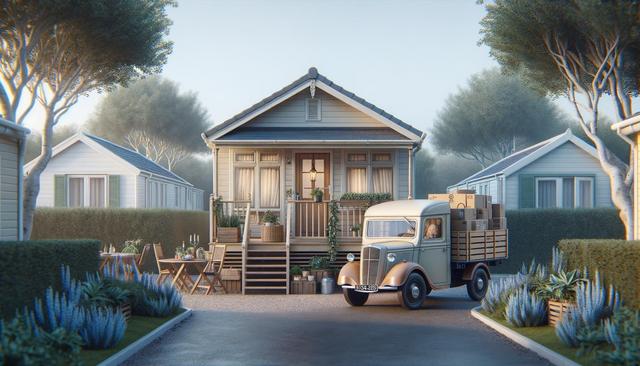Exploring the Versatility and Value of Mobile Homes
Mobile homes offer a flexible and often more affordable alternative to traditional housing, appealing to a wide range of homeowners.

What Are Mobile Homes?
Mobile homes, also commonly referred to as manufactured homes, are residential structures built in a factory setting and then transported to their final location. Unlike traditional houses that are constructed on-site, mobile homes are built under controlled conditions, which can reduce both construction time and cost. These homes are required to meet specific building codes, ensuring safety and durability. Once delivered, they are typically installed on a permanent or semi-permanent foundation.
There are two primary types of mobile homes: single-wide and double-wide units. Single-wides are narrower and easier to transport, while double-wides offer more interior space and resemble traditional homes more closely. Some modern manufactured homes even combine multiple sections to create expansive living areas.
Common features of mobile homes include:
- Open floor plans with efficient use of space
- Modern appliances and fixtures
- Energy-efficient insulation and windows
- Customization options for layout and finishes
This type of housing continues to evolve with changing design trends and technological improvements, making it a viable option for a broad audience.
The Advantages of Choosing a Mobile Home
One of the most significant benefits of mobile homes is their affordability. Compared to site-built homes, manufactured homes typically cost less per square foot, allowing more people to become homeowners. This affordability extends to ongoing expenses as well, with many mobile homes offering lower utility bills thanks to energy-efficient construction methods.
In addition to cost savings, mobile homes provide flexibility in location. Whether placed in a mobile home park or on private land, they offer versatile living arrangements suited to various lifestyles. For instance, retirees may appreciate the low-maintenance nature, while young families might see it as a stepping stone toward homeownership.
Further advantages include:
- Faster move-in times due to off-site construction
- Lower property taxes in many areas
- Opportunities for customization
- Increased accessibility for those with mobility challenges
These features make mobile homes attractive to a diverse demographic, from first-time buyers to downsizing seniors.
Challenges and Considerations
Despite the many benefits, there are some considerations to keep in mind when opting for a mobile home. One key factor is the potential for depreciation. Unlike traditional homes, some manufactured homes may lose value over time, especially if not properly maintained or located in less desirable areas.
Financing can also be a bit more complex. While many lenders do offer loans for mobile homes, the terms can vary based on whether the home is classified as personal property or real estate. It’s important to research financing options thoroughly and understand what type of loan structure will apply.
Other challenges include:
- Zoning regulations that may limit where mobile homes can be placed
- Availability and cost of land, if not moving into a park
- Maintenance responsibilities, especially for older units
Being aware of these potential issues and planning accordingly can help mitigate risks and ensure a smoother ownership experience.
Modern Design and Customization Options
Today’s mobile homes are far removed from the basic models of decades past. Manufacturers now offer a wide range of design options that cater to modern tastes and needs. From stylish kitchens to spacious bathrooms, these homes can be tailored to reflect individual preferences and lifestyle requirements.
Interior options often include:
- Granite countertops and stainless steel appliances
- Walk-in closets and en-suite bathrooms
- Energy-efficient HVAC systems
- Smart home features like programmable thermostats and security systems
Exterior enhancements are also widely available, such as porches, patios, and landscaping packages. These additions further blur the line between mobile homes and site-built houses, creating a living environment that feels both modern and comfortable.
As consumer expectations evolve, manufacturers continue to innovate, offering more choices and higher-quality materials than ever before.
Living in a Mobile Home Community
Mobile home communities offer a unique lifestyle experience that can be especially appealing to those seeking a sense of community and shared amenities. These communities often provide services and features such as on-site maintenance, recreational facilities, and social events, creating opportunities for residents to connect with neighbors.
Benefits of living in a mobile home park include:
- Lower monthly costs compared to traditional neighborhoods
- Access to community amenities like pools, clubhouses, and walking trails
- Enhanced security and shared maintenance responsibilities
However, it’s essential to understand the terms of residency, which may include lot rent, park rules, and regulations. Prospective residents should carefully review lease agreements and community guidelines before moving in.
For many, the combination of affordability, convenience, and community engagement makes mobile home parks a suitable and enjoyable living option.
Conclusion
Mobile homes represent a practical and adaptable housing choice that continues to gain popularity among a broad spectrum of individuals and families. With their cost-efficiency, design flexibility, and evolving quality standards, they serve as a compelling alternative to traditional homes. Whether you’re a first-time homebuyer, a retiree seeking a simpler lifestyle, or someone in search of a community-oriented living space, mobile homes offer a range of possibilities worth exploring. As with any housing decision, careful planning and informed choices are key to finding the right fit for your needs and long-term goals.